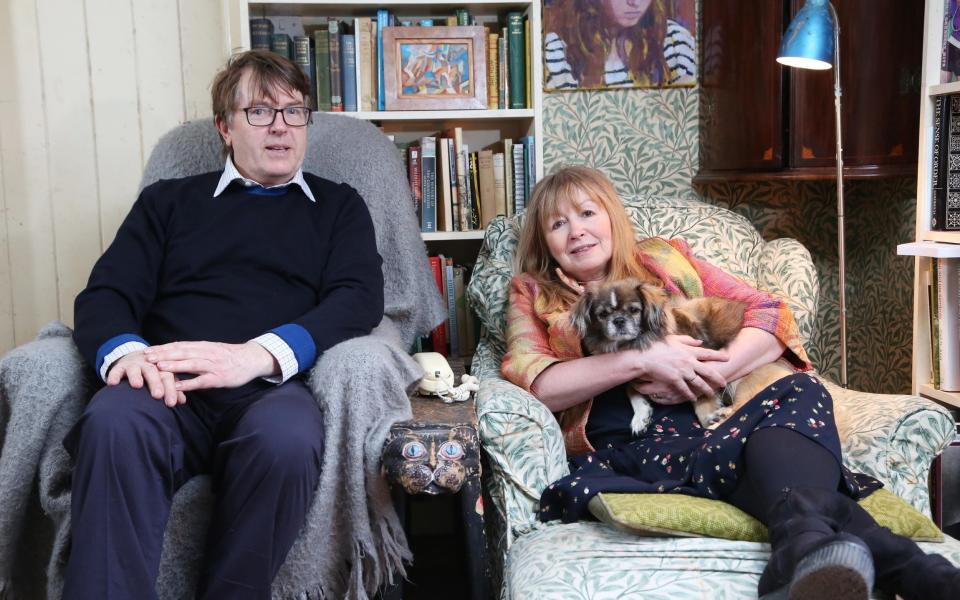Delia’s right – menfolk really are taking over the kitchen

In the past couple of years, I have acquired a new role: chief cook (and bottle-washer) to my wife, Moya, so that she can concentrate on her career. It is, I have learned, a situation we have in common with one of Britain’s best-loved cookery writers, Delia Smith, and her husband, Michael Wynn-Jones.
Having taught the nation about boiled eggs and pancakes for the best part of 50 years, Delia revealed that during the pandemic, she handed over to her spouse the nightly food duties without looking back. Enough was enough.
And although Moya is a CBT therapist rather than a cook, a similar thing happened in our home. With Covid lockdowns, together with all the ensuing difficulties/illnesses that have come with the pandemic, good therapists like my wife have been busier than ever, mostly seeing their clients on Zoom. For hours. And hours. And more hours.
While I, on the other hand, have for the past six decades managed to scrape a living by combining two precarious and unreliable professions: acting and writing.

The difficulties of the pandemic have helped slowly bring the curtain down on my long acting career. To be honest, taking over the nightly meal preparation was something of a pleasure. Some years ago, I was one of the contestants in Celebrity MasterChef.
I was quietly confident in my culinary abilities – until I was cruelly culled in the second round and had to be removed forcibly from the studio to my cries of ‘I wuz robbed!”
But the experience did not put me off – and, with the opportunity to be useful in lockdown as incentive, I have carried on developing my signature dishes: crispy duck leg with red cabbage, Wiener Schnitzel with warm potato salad and sliced cucumber vinaigrette.
My spag bol is a repast of wonder. And I make a mean kleftico with delicious roast potatoes and spinach. Salmon I loathe, but will cook for my hard-working wife while I am content to eat the previous evening’s leftovers.
One complaint: some nights I never know when she is going to get home. That’s very taxing to any chef’s timing.
I do have one awful flaw, however. I need endless dollops of not pudding, but praise. Whatever I cook is punctuated with the following dialogue:
“Isn’t this good, darling?”
“Yes, George, delicious.”
“But seriously, darling, this is good, isn’t it?”
“It’s very good, it’s lovely.”
“But honestly, darling, if you had this in a restaurant, you wouldn’t be surprised, would you?”
“George – it’s effing marvellous. Thank you. Take a bow!”
Silence as we eat.
“But it is good, isn’t it..?”
Perhaps Delia is required to supply the same sort of accompaniment to meals prepared by her husband. Either way, it seems to me a fair price to pay for our home-cooked delights, made with love.
John Sergeant: ‘The lockdown has let me shine in the kitchen’

The awful blast of the pandemic had one entirely beneficial effect on my family life. At last I was given a chance to shine in our kitchen.
My wife, Mary, is flexible and friendly in many ways, but there was always a danger she might use her rolling pin to chase me away from the pots and pans.
But when lockdown rules included an hour each day for exercise, there was the chance of a breakthrough. I took to walking to the shops each day, a two-mile round trip, with plenty of time to ponder the all-important dinner menu.
Choosing the menu, buying all the stuff, surely in all fairness I must be allowed to finish the job? Happy marriages need compromise. When Mary went off for her charity stints I won the keys to the kitchen. One thing led to another. I had to buy an air fryer, otherwise how could we make the perfect crispy pork belly? And for lunch I could rustle up a Scotch egg; and rhubarb crème brûlée proved really quite easy. I am not as impressive as Delia Smith’s husband, but I’m getting there.
Mary Killen: ‘Giles once served a full English breakfast to our dinner party guests’

The most I could do before marriage was boiled eggs. But Giles has got the knack of making good food and I’m always so busy with admin, cleaning and working that I just don’t have time for cooking as well.
The size of our kitchen constrains what he is able to produce, and therefore it’s almost always a roast: partridge, guinea fowl, pheasant or rabbit in green lentil purée from the Constance Spry cookery book, or a risotto, or pasta made with stock and wild garlic leaves from outside the cottage, because there are no surfaces to chop on.
The most popular thing he makes is fishcakes; he puts oven-baked bread in a plastic bag and stands on it to make the breadcrumbs.
But one of the most successful dinners he ever gave was for a group of sophisticated and spoilt men. Giles served full English breakfast at night. He included lamb chops and sautéed potatoes alongside the bacon, egg, tomato and black pudding, with a round of toast. Every one of them said it was the most delicious and unexpected dinner they ever had.
Debora Robertson: ‘I am pathetically grateful for my husband’s efforts in the kitchen’

I’m a food writer, so when I’m up to my eyes in food testing, I exist on leftovers and toast.
We have chicken pie weeks, omelette weeks, soup weeks, as I try to perfect whatever’s in the latest article or book.
Sometimes, I just get sick of the sight of food and chopping another bloody onion is as tempting as scabies.
That’s when my husband, Séan, steps in. In truth, he’s the one who is technically trained with a degree in catering and hotel management.
He’s doing it now, as I type this: grilling salmon with roasted asparagus and young carrots, and I am pathetically grateful.
He also loves to shop for food and during lockdown, he enjoyed the treasure-hunt aspect of finding perfect mail-order steaks or salamis, butter or eggs from hens whose names came on the box – I exaggerate, but not much.

 Yahoo News
Yahoo News 
